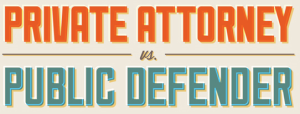In this 2007 Op-Ed, Judge Morris Hoffman explains the study he and two economists conducted to compare the quality of defense put forth by public defenders versus private attorneys. The study found the clients of public defenders were given significantly longer sentences than the clients of private attorneys. However, the study’s authors suggest this difference is due to guilty defendants self-selecting a public defense. The study’s abstract:
An econometric study of all felony cases filed in Denver, Colorado, in 2002, shows that public defenders achieved poorer outcomes than their privately retained counterparts, measured by the actual sentences defendants received. But this study suggests that the traditional explanation for this difference – underfunding resulting in overburdened public defenders – may not tell the whole story. The authors discovered a large segment of what they call “marginally indigent” defendants, who appear capable of hiring private counsel if the charges against them are sufficiently serious. These results suggest that at least one explanation for poor public defender outcomes may be that public defender clients, by self-selection, tend to have less defensible cases. If marginally indigent defendants can find the money to hire private counsel when the charges are sufficiently serious, perhaps they can also find the money when they are innocent, or think they have a strong case.
If the truly guilty are more likely to pick a public defender rather than consume their own resources on a private attorney, we would expect public defenders’ clients to have longer average life-sentences.
It’s an interesting point, but it’s hard to verify. There would have to be a way to measure the proportion of guilty clients outside of tallying guilty verdicts and plea bargains. There’d also have to be a way to isolate the variable of guilt, which may be tricky since income is also an important variable and certain criminal activity is correlated with certain socioeconomic levels. There’s also the variable of how overworked different attorneys become–how would researchers quantify “overworked” and how would they compare public vs. private attorneys accordingly?
I’d also be interested to read studies about the demographics of people who choose to become defense attorneys compared to prosecutors. Are there measurable psychological and personality differences? Do those differences affect work performance?
Anyone have any info on this?

I have no idea how to verify anything on your list, but good to see you’re alive Monica :)
You too, buddy. :) I’m on gmail chat sometimes, you can hit me up there maybe.